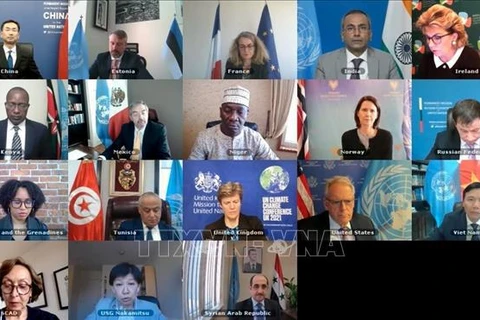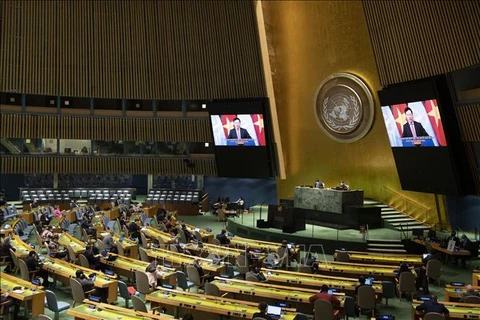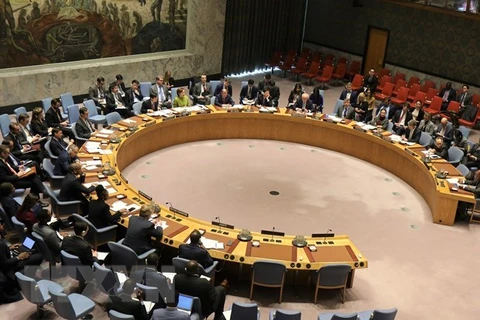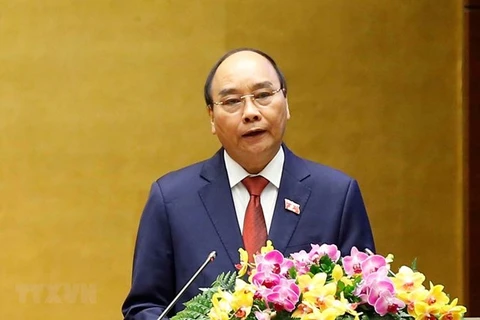Hanoi (VNA) – State President Nguyen Xuan Phuc on April 19 chaired the High-level Open Debate of the United Nations Security Council on "Cooperation between the UN and regional organizations in enhancing confidence-building and dialogue in conflict prevention and resolution".
The following is the full text of his statement at the event.
"Ladies and gentlemen,
Trust, confidence and dialogue lay the solid foundation for international relations. Rising from the ashes and sorrows of World War II, the UN has become the very symbol of our deep conviction and mutual trust in multilateralism and multi- tiered international cooperation.
Guided by such faith, many regional organizations were established and have since thrived. Our briefers today, representing organizations from various regions, will give us an overall picture of their active contributions to conflict prevention and resolution, and facilitation of dialogue, peace and reconciliation processes.
As an active ASEAN member, having just fulfilled its role as the 2020 ASEAN Chair, Vietnam takes great pride in ASEAN’s success in building a region of peace, cooperation, trust and dialogue, and a cohesive and responsive ASEAN Community, striving toward an open, transparent, inclusive and rules-based regional architecture.
ASEAN has established a partnership with the UN and created several mechanisms and forums for political and security dialogues with other countries, including the five Permanent Members of the Security Council. In January 2020, Vietnam chaired the Council’s open debate on Cooperation between the UN and ASEAN in maintaining international peace and security.
Setting confidence-building and dialogue as priorities, ASEAN has been working with China to negotiate the establishment of the Code of Conduct in the South China Sea (COC), with a view to maintaining peace, stability, maritime security and safety in the South China Sea.
ASEAN is also playing a central role in seeking adequate solution to help stabilize the situation in Myanmar through dialogue and reconciliation.
Ladies and gentlemen,
While peace, cooperation and development continue as the prevailing trend and fervent aspirations of all countries and peoples, the world that we live in today is riddled with challenges. In the past five years, conflicts have taken away half a million lives across the globe. In 2020 alone, the world recorded 20 million refugees, over 50 million people displaced due to conflicts, and around 170 million in need of humanitarian assistance. These are the people who are left behind, and call upon our Council to take action.
Against major challenges, such as COVID-19, natural disasters, severe climate change, border and territorial disputes and conflicts, frictions, and geo-strategic competition, increased international unity is more crucial than ever.
Yet, the paradox at present lies in our waning trust in one another and in multilateral institutions. The strengthening of unity is of great necessity, starting with the cooperation between the UN and the UNSC with regional organizations in our joint efforts to prevent and resolve conflicts through dialogue and confidence-building.
In this important debate, I would like to underscore three proposals:
First, the interactions and complementarities between the UN and regional organizations are inherent. They offer a “two-way linkage” to share knowledge and coordinate joint endeavours. The UN should take the lead in increasing cooperation activities and exchanges of experience and best practices in confidence-building and dialogue to prevent conflicts. On the other hand, regional organizations, with their unique strengths in practical experience, resources and diverse demands, should bolster cooperation with the UN, engage in dialogues and share experience at various forums to enhance capacity in preventing and resolving conflicts.
Second, we should further promote the role of multilateralism and uphold the UN Charter and international law, for this is the most concrete and solid foundation to build trust and promote dialogues.
Moreover, to early conflict prevention requires inclusive and comprehensive solutions to address the root causes of conflicts, such as poverty, hunger, inequality and violence. The international community should strive to fulfill the 2030 Agenda for Sustainable Development, and other global security and development strategies and initiatives led by the UN, paying greater attention and giving adequate assistance to developing countries who face serious resources’ constraints.
On their part, regional organizations need to have comprehensive agendas, and integrate the UN’s development frameworks and initiatives into their national and regional development plans. They should also strive to narrow political, economic and cultural gaps amongst themselves. In South East Asia, ASEAN is making every effort to fulfill the goal of building an ASEAN Community united in politics, diverse in culture, connected in economy, and with increased cooperation with external partners. As an active ASEAN member, Vietnam has effectively placed COVID-19 under control, enjoyed a high economic growth rate, and actively engaged in international integration.
Third, we need to continue enhancing cooperation between the UNSC and regional organizations through dialogue and co-operation frameworks, and early warning mechanisms for volatilities.
The UNSC needs to continue acknowledging and respecting the perspectives, role and contributions of regional organizations. We also need to mainstream conflict prevention and resolution strategies via dialogue and confidence-building in UN Missions, and create favorable conditions for regional organizations to uphold their central role.
In response, regional organizations should further strengthen their proactive and leading role in preventing and resolving conflicts in accordance with international law and the UN Charter. This can only be achieved when each and every member state has strategic trust in each other and share a common political resolve.
Ladies and gentlemen,
Vietnam is honoured to assume the Presidency of the Security Council for the second time. With the aspiration to become a peaceful and prosperous nation, a reliable partner, and a responsible member of the international community, Vietnam remains steadfast in our foreign policy of independence, sovereignty, diversification and multilateralization of relations, promoting international integration and actively contributing to the efforts of the UN and the UNSC.
Faithful to our motto - “Partnership for sustainable peace”, Vietnam will spare no effort to strengthen the cooperation between the UN and regional organizations, including ASEAN, and elevate such ties, for peace, security and development around the world.
Thank you"./.
VNA
























